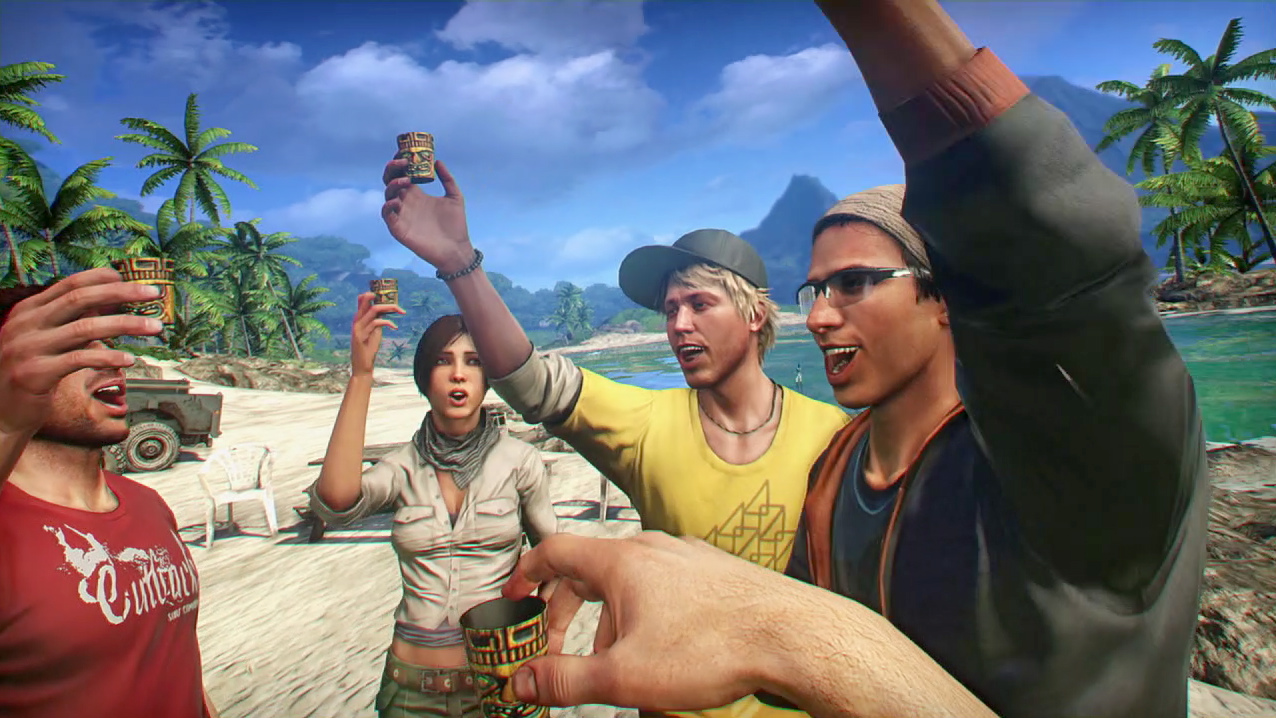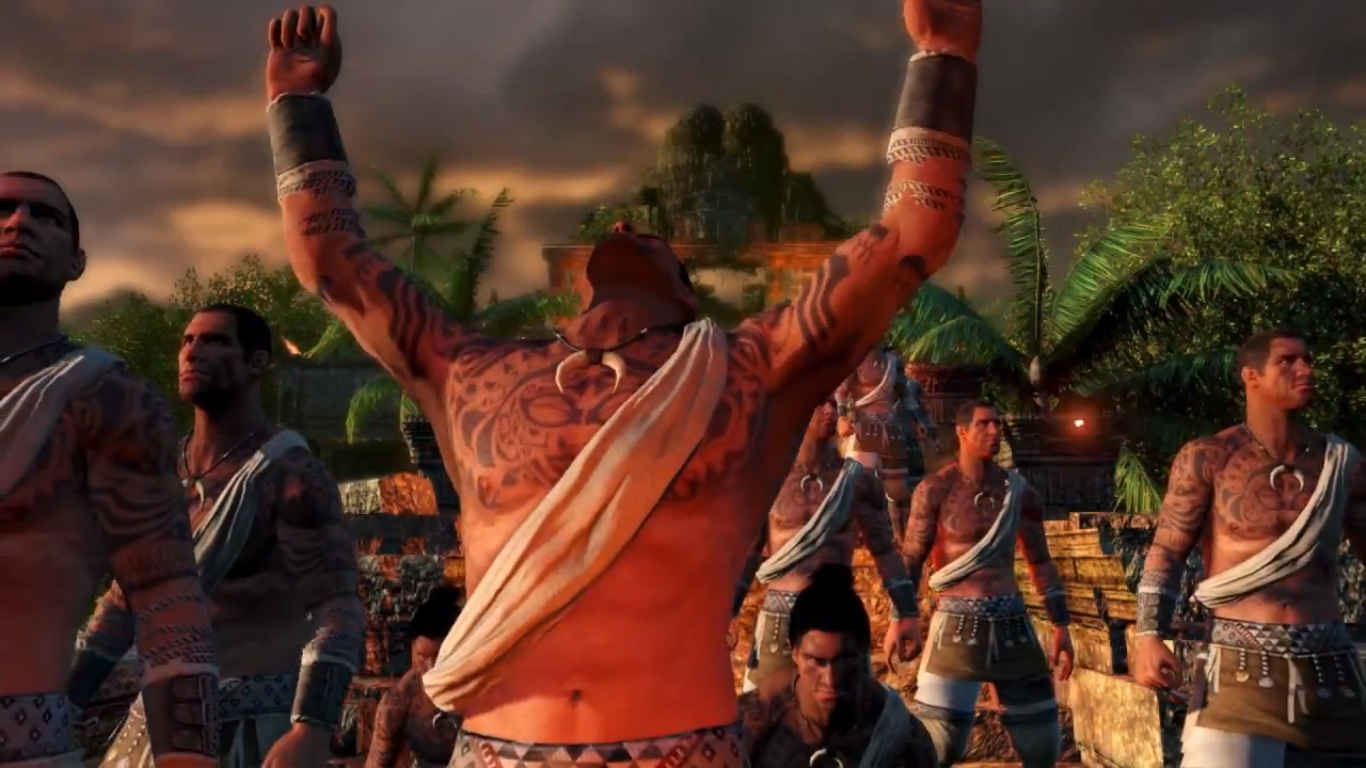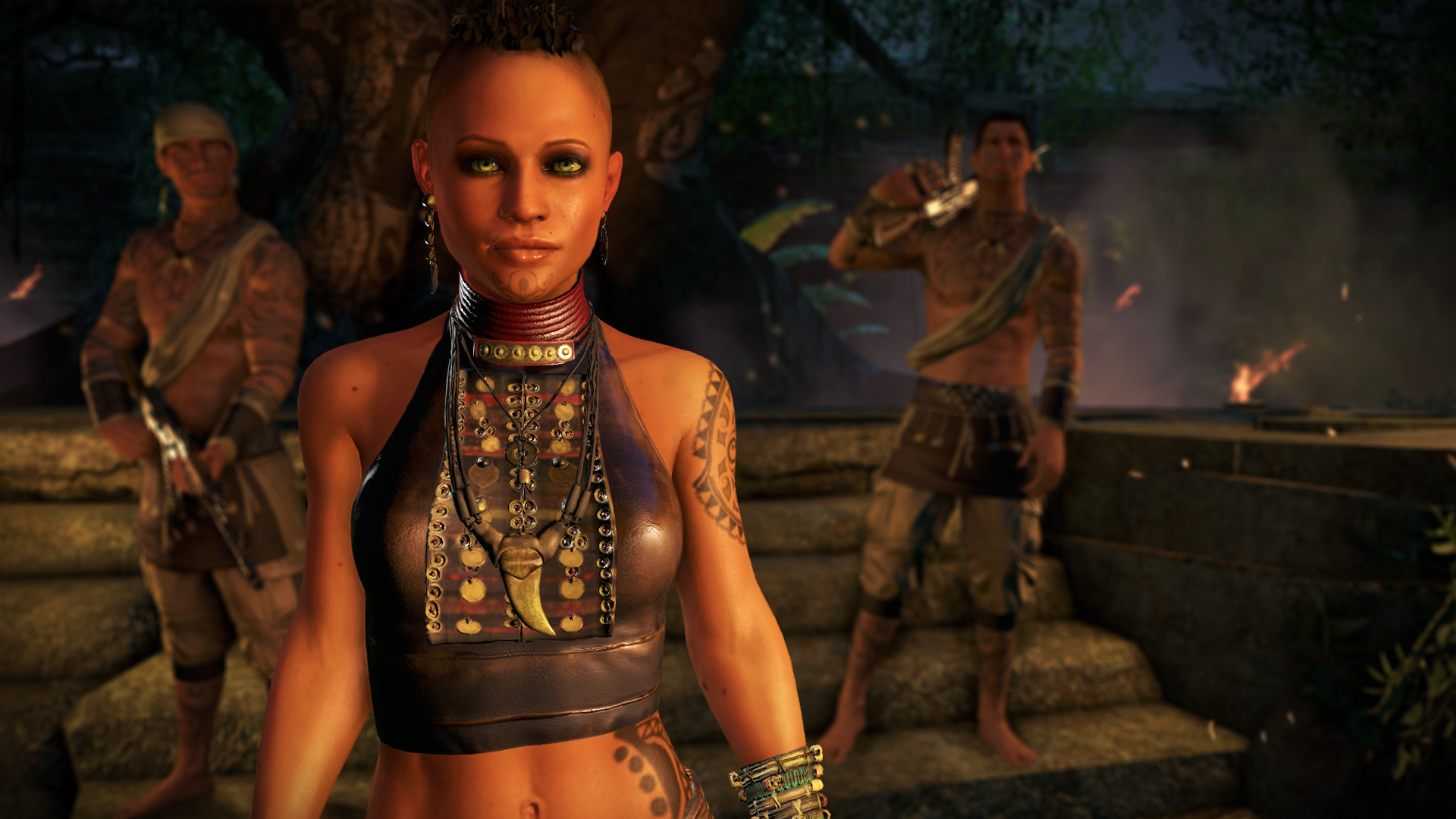Having taken longer than most people probably have to finish Far Cry 3, I find that I had expected more to have been written about it and interpreting it. Perhaps too many words have already been expended upon Spec Ops: The Line, which shares some characteristics with Far Cry 3 to be sure, but is in my view a wholly different experience.
Where The Line was itself a critique and condemnation of the contemporary shooter genre and the acts that constitute such a game (and something about which I still need to write), Far Cry 3 is something more. It serves not so much as a direct critique of the first-person shooter, but more as a framework for the player to start thinking critically.
I find that much I have read regarding Far Cry 3 is mired in direct conversation regarding the whats and the hows of the game and its systems, and less about the whys. Indeed, as I started playing the game, I too found myself dwelling on questions of design and mechanics and less about what those things did to inform the story—and more importantly, the message—of the game.
I know now this is the wrong way to approach Far Cry 3. Indeed, now that I have reached the end and applied some critical thinking to what I witnessed and did, I find that I second-guess any such criticisms I had as I’m no longer sure what of those are honest mistakes and what are things that were done intentionally in order to provoke such a response.
N.B.: Here be spoilers. What follows will also more than likely be extremely pretentious, as I can’t stop talking about it. If you have reactions or discussion points, I invite you to leave a comment, or more so to write about it on your own blog.
I’ll assume you know what happened in Far Cry 3 and just get to the good stuff and I truly believe it’s better if you experience it for yourself. In any case, I would urge you not to read this before you play the game so you can form your own conclusions.
The Friends
It’s not even half-way through the game that Jason has rescued his friends. They are all together (sans his brother Riley, who they think is dead), they have a boat that’s salvageable, and they have the opportunity to escape the situation. I wanted Jason to just put everything down and escape with his friends. in a real, life-and-death situation, it would be the natural choice.
But his decision is not to do this (followed by my yelling at the TV that he is an idiot). Instead he chooses to stay on the island—to exact revenge on the antagonist Vaas for the killing of his brothers, and stating that he has found a purpose in his life where once he thought he had none.
The objectives of the game have changed. The goal is less killing for the sake of (supposed) necessity and heroism towards his friends, and more to the cold, hard goal of vengeance. He is put at odds with his friends, who do not see the need for additional violence and just want to leave.
But Jason is entranced by the lure of the Rakyat and their priestess and leader, Citra (Vaas’s sister). She offers to him the promise that he is a mythically foretold warrior and savior of the Rakyat people. He comes to slay a god and in so doing become a godlike warrior himself.
Though he arguably has lost control long before this point (remember his commanding presence in each getaway driving sequence with the friends) it is when he abandons his friends that the downward slide is uncontrollable. Things can only end in violence.
The friends on the island are not just Jason’s past, but also his conscience. They are an anchor to the “real world” as opposed to the warped and altered state of the island and Jason’s attitude towards everything on it. In the end, they are the only people who are behaving rationally.
The Rakyat
From setting out on his adventure, Jason believes (and is led to believe, most especially by Dennis) that the Rakyat need his help—that he needs to become their mythical warrior and lead them to victory over the oppressors of the pirates and privateers. This is a manipulation, both in terms of the story of Jason’s journey into darkness and in terms of the game itself.
When you liberate an outpost, what happens? As soon as the flag is changed to the friendly blue (meaning you have killed all the enemies there, for there is no other method for capturing an outpost), a vehicle of fully armed Rakyat appear to commandeer the base. They appear to have weapons of their own, and indeed will engage the other factions if they are within range.
If this is true, what need do they have of one person, mythically foretold warrior or not? Can’t the Rakyat just take control of everything for themselves? Jason never once questions this, and for most players, I would assume they do not question it, either. The player of a shooter is often the lone warrior, the John McClane, the exaggerated hero (cf. Marcus Fenix, Master Chief, Martin Walker). We’re used to it.
Jason is being manipulated for the needs of the Rakyat (and more importantly Citra), who seem to have a very large number of very able-bodied warriors at their disposal. Look at the missions that are put before you in the game: everything the Rakyat ask you to do, be it a story mission, capturing an outpost, or performing bulletin board tasks, requires and revolves around getting Jason to perpetrate further violence.
Citra
Citra is the leader of the Rakyat. She is the catalyst to Jason’s development into the warrior he decides he wants to become. Determined, focused, and driven, she commands her people and receives from them absolute loyalty.
She is also blatantly manipulative and deceptive. Dennis starts Jason’s path of the tatau and his desire to build upon that, but Citra is the enticement. She leads Jason on through her telling of the “myth” of the warrior. She revels in the violence he creates, convincing him that it is a good thing and that it will bring him everything he desires—including her.
Most times she deals with Jason directly, she alters his state of mind through poison or drugs. She tells him what he wants to hear, whispers in his ear promises of power and victory through the application of and devotion to violence.
Citra is the personification of the male power fantasy that dominates video games and in particular the shooter genre. In a way, she is video games (hat tip to Charles for clueing me in). She represents an escape: a respite from real life and an alternative reality (remember the friends, whom she convinces Jason to leave behind). Everything she does to Jason is manipulative and serves this feeling of power.
Jason wants to be the white man who literally falls out of the sky and rescues the (supposedly) weak locals? She will tell him what he wants to hear. Jason wants to learn to kill better, more ruthlessly, more efficiently? She will tell him what he wants to hear. Jason wants to “protect” her, to win for her, to gain her sexual affections? She is only too happy to oblige. She is a vision of gratuitousness, appearing half-naked, speaking seductively, encouraging more and more needless violence.
This is why to many people Jason’s reactions to her advances are inexplicable. When we as players are presented with objectives and reasons to kill, we only too happily agree to do these things. When Jason’s voice is added to the conversation, while Citra is most obviously using him for her own purposes, we grow uncomfortable and feel that he is an idiot—even though he is doing only that which we have done in playing games for a long time.
And the real kicker is that if you stop to think about it, Citra doesn’t need Jason to do any of the things he does—at least, not for the reasons Jason thinks and says. She has her army, ready to fight and to die for her. She is, as a character, far from helpless or needy. Yet Jason chooses to fit her into his preconceptions and his personal power fantasy that drives the narrative of Far Cry 3.
All this builds to the conclusion of the game, in one horrific choice.
Hard Choices?
At the conclusion of the game, Jason finally exacts his revenge against Hoyt and rescues his brother, only to find that Citra has captured his friends. When he goes after them, Citra drugs him and he is captured as well.
Under this (yet again) altered state of mind, Jason walks a path of fire. His friends appear on the path, twisted by the visions into literal demons. They wear the mask of the giant killed by the mythical warrior. Citra and the Rakyat want Jason to see his friends as evil, even though they are truly helpless and innocent.
At the end of this sequence, Jason is presented with a choice. He holds in his hand a knife that has been an object of focus during his journey to becoming the warrior of legend. The knife is held to the throat of Liza—one of the friends from the start of the game and his girlfriend in the story. She is bound, helpless, and pleading for her life. Citra’s offer? To stay with her and become the warrior she “needs,” and to sever his ties with the past.
To keep this in focus: to fulfill the final request made by the character (Citra) who to this point has been guiding Jason on his objective path, the player must press a button that murders an unarmed and defenseless woman in cold blood. To do so is to make complete the transformation of the main character from the “everyman” into an icon of violence and hatred.
Being honest, I found that this was not an option for me. Though it is a game, I could not bring myself to think that this action was in any way acceptable. The final choice is the blunt conclusion of the game’s themes; to get the player to commit a completely heinous (virtual) act in service to the game itself.
Should you choose as I did, the game ends right there with very little additional explanation. Jason muses that he left the island, but that he may never really be redeemed—similar to Walker’s thoughts at the end of The Line should you choose to leave Dubai without a final stand. If a human being committed the acts that any video game portrays in real life—regardless of motivation or justification—would they ever recover or be redeemed in their own minds?
If you choose to stay with Citra, Jason is more literally consumed by his violence, stupidity, and hatred. His single-mindedness blinds him to his ultimate end. Fulfilling the power fantasy offered at the end of Far Cry 3 rewards Jason with more power fantasy in the form of a (for video games) somewhat explicit sex scene with Citra. After all, isn’t that the goal? Killing and conquering leading to getting the girl?
But of course, the revelation is that Jason is being used. He’s a sperm donor for Citra, creating the next leader of the Rakyat by fulfilling his fantasy and Citra’s wishes. And in the end, he is rendered dehumanized, just like his victims: breeding stock who is then sacrificed on an altar with the same knife to the chest—like an animal.
The choice at the end is whether or not to be a human being.
What Then?
There are so many subtexts and contexts that weave in and out of Far Cry 3 that I find I need to stop at only two thousand(!) words. Comparisons to Spec Ops: The Line. Commentary on things like open world conquering, dehumanization of enemies as gameplay bonuses, or criticism of torture as a narrative device in violent games. Critics who didn’t “get it” and are now criticizing the wrong things. Whether people who don’t “get it” strengthen the message. (Spoiler: they do.)
I would encourage you to play the game and form your own thoughts and criticisms of the medium. Where can we go from here? Is this the start of a new trend in storytelling? How can we best discuss these things and contribute.
Gaming is coming of age, and we are fortunate to be along for the ride.
If you have thoughts, please feel free to leave a comment – if you have written about this and would like to discuss, leave a link as well! The more people discussing this, the better.



Haven’t played it (and probably never will get around to it), but it sounds great. Love reading stuff like this.
What about Vaas? In my opinion, in the moment when Jason kills Vaas he just becomes him (in mind). He’s taking his role and continues his adventure as Vaas (Citra wanted her sperm donor to be Vaas at start, but then he realised that he is used and escaped her just to work for Hoyt). Vaas mentioned in game that the first time he killed was for Citra. Isn’t that true for Jason? I just think that when Jason killed Vaas he proceeds as him, as he would’t realise that he is used. In the “kill your girlfriend” ending Jason dies by getting stabbed in the chest by the ancient dagger, in the same way he killed Vaas.
Please let me know what you think about it, do you have any other thoughts about Vaas?
Sorry for my English if there is anything wrong with the text.
I would really like to know more about Vaas’ role in-game.
To be honest, the one thing I haven’t really pieced together is where Vaas comes into the situation. In one way, he’s the example of what will happen to Jason should he go overboard, but on the other hand, in the end he’s actually a force that is trying to stop Jason from doing something that is massively unwise.
And really, now that I think about it, maybe that’s the idea. He’s there as this force that appears for all intents to be insane and crazy, but with the way he tries to block Jason from taking the path that ultimately ends in his demise, Vaas is a force for good. Is he crazy? Or does he just appear to be crazy to Jason/the player?
An interesting thought.